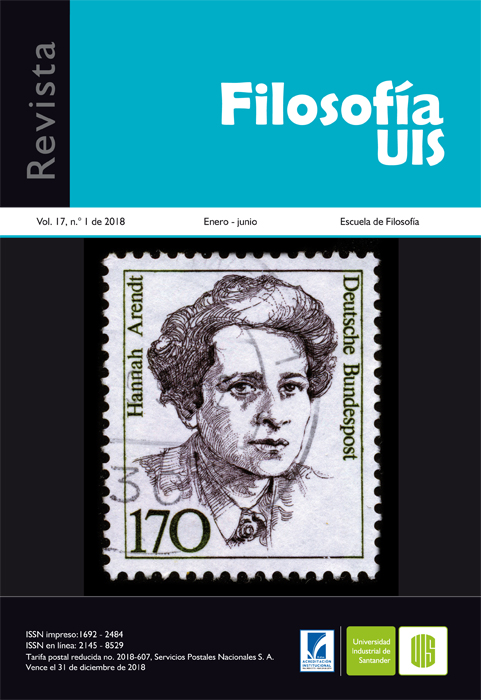Articles
The role of the community in the relationship between science and faith. Approaches to the epistemological proposals of Thomas Kuhn and Mariano Artigas
Published 2018-05-16
Keywords
- science,
- paradigm,
- community,
- anthropological faith,
- language
How to Cite
Pereira Ríos, D. (2018). The role of the community in the relationship between science and faith. Approaches to the epistemological proposals of Thomas Kuhn and Mariano Artigas. Revista Filosofía UIS, 17(1), 271–287. https://doi.org/10.18273/revfil.v17n1-2018013
Copyright (c) 2018 Revista Filosofía UIS

This work is licensed under a Creative Commons Attribution 4.0 International License.
Abstract
Sharing a time of searching for truths and the passion to find them in their researches, Thomas Khun and Mariano Artigas, perhaps by paths that intersect, will show us a key element: human community. It is what gives us the necessary structure so that science and faith may find ways of solving the questions of the human kind, making use of its own tools, such as language. This can be the privileged path to find some truth that helps humanity to continue to understand itself.
Downloads
Download data is not yet available.
References
Artigas, M. (1992). Ciencia y fe: nuevas perspectivas. Pamplona: EUNSA.
Artigas, M. (1995). La inteligibilidad de la naturaleza. Pamplona: EUNSA.
Artigas, M. (2004). Ciencia, razón y fe. Pamplona: EUNSA.
Boff, L. (1975). La experiencia de Dios. Bogotá: Stella.
Catalão, H. (2007). Thomas S. Kuhn no limiar da Filosofía da Religião. Revista Portuguesa de Filosofía, 63 (1-3), 677-681.
Chalmers, A. (1982). ¿Qué es esa cosa llamada ciencia? Una valoración de la naturaleza y el estatuto de la ciencia y sus métodos. España: Siglo Veintiuno Editores.
D’ Agostini, F. (2000). Analíticos y continentales. Guía de la filosofía de los últimos treinta años. Madrid: Cátedra.
De A. Dutra, L. (2007). A Concepção Social da Investigação Científica segundo Thomas S. Kuhn. Revista Portuguesa de Filosofía, 63(1-3), 93-120.
De Laborda, A. (1989). La ciencia contemporánea y sus implicaciones filosóficas. Madrid: Cincel.
Dürr, H. (2007). Física e trascendência. Revista Portuguesa de Filosofía, 63(1-3), 25-47.
Giberson, K. y Artigas, M. (2012). Oráculos de la ciencia. Científicos famosos contra Dios y la religión. Madrid: Encuentro.
Heidegger, M. (2006). Carta sobre el humanismo. Madrid: Alianza Editorial.
Klimovsky, G. y De Asúa, M. (1992). Corrientes epistemológicas contemporáneas. Buenos Aires: Centro Editor de América Latina.
Khun, T. (1971). La estructura de las revoluciones científicas. México: Fondo de Cultura Económica.
Moltman, J. y Boff, L. (2014). Há esperança para a criaçao ameaçada? Petrópolis: Vozes.
Nolan, A. (2011). Jesús. Hoy. Una espiritualidad de libertad radical. Santander: Sal Terrae.
Tomeo, A. (1996). Nosotros y la ciencia. Una introducción a la filosofía de la ciencia. Montevideo: Latina.
Torres Queiruga, A. (1992). La constitución moderna de la razón religiosa. Navarra: Verbo Divino.
Vattimo, G. (2002). Introducción a Heidegger. Barcelona: Gedisa.
Cibergrafía
Artigas, M. (1994). Ciencia y fe: nuevas perspectivas. Après Galilée. Science et foi: nouveau dialogue, sous la direction du cardinal Paul Paupard. Desclée de Brower, París, pp. 199-214. Recuperado de: http://www.unav.edu/web/ciencia-razon-yfe/ ciencia-y-fe-nuevas-perspectivas
Artigas, M. (1999). El diálogo ciencia-fe en la Encíclica Fides et ratio. Anuario Filosófico, (32), 611-639. Recuperado de: http://www.unav.edu/web/cienciarazon-y-fe/el-dialogo-ciencia-fe-en-la-enciclica-fides-et-ratio
Artigas, M. (2005). Evolucionismo y fe cristiana. Seminario de CRYF, Universidad de Navarra. Recuperado de: http://www.unav.edu/web/ciencia-razon-y-fe/evolucionismo-y-fe-cristiana
Artigas, M. (1995). La inteligibilidad de la naturaleza. Pamplona: EUNSA.
Artigas, M. (2004). Ciencia, razón y fe. Pamplona: EUNSA.
Boff, L. (1975). La experiencia de Dios. Bogotá: Stella.
Catalão, H. (2007). Thomas S. Kuhn no limiar da Filosofía da Religião. Revista Portuguesa de Filosofía, 63 (1-3), 677-681.
Chalmers, A. (1982). ¿Qué es esa cosa llamada ciencia? Una valoración de la naturaleza y el estatuto de la ciencia y sus métodos. España: Siglo Veintiuno Editores.
D’ Agostini, F. (2000). Analíticos y continentales. Guía de la filosofía de los últimos treinta años. Madrid: Cátedra.
De A. Dutra, L. (2007). A Concepção Social da Investigação Científica segundo Thomas S. Kuhn. Revista Portuguesa de Filosofía, 63(1-3), 93-120.
De Laborda, A. (1989). La ciencia contemporánea y sus implicaciones filosóficas. Madrid: Cincel.
Dürr, H. (2007). Física e trascendência. Revista Portuguesa de Filosofía, 63(1-3), 25-47.
Giberson, K. y Artigas, M. (2012). Oráculos de la ciencia. Científicos famosos contra Dios y la religión. Madrid: Encuentro.
Heidegger, M. (2006). Carta sobre el humanismo. Madrid: Alianza Editorial.
Klimovsky, G. y De Asúa, M. (1992). Corrientes epistemológicas contemporáneas. Buenos Aires: Centro Editor de América Latina.
Khun, T. (1971). La estructura de las revoluciones científicas. México: Fondo de Cultura Económica.
Moltman, J. y Boff, L. (2014). Há esperança para a criaçao ameaçada? Petrópolis: Vozes.
Nolan, A. (2011). Jesús. Hoy. Una espiritualidad de libertad radical. Santander: Sal Terrae.
Tomeo, A. (1996). Nosotros y la ciencia. Una introducción a la filosofía de la ciencia. Montevideo: Latina.
Torres Queiruga, A. (1992). La constitución moderna de la razón religiosa. Navarra: Verbo Divino.
Vattimo, G. (2002). Introducción a Heidegger. Barcelona: Gedisa.
Cibergrafía
Artigas, M. (1994). Ciencia y fe: nuevas perspectivas. Après Galilée. Science et foi: nouveau dialogue, sous la direction du cardinal Paul Paupard. Desclée de Brower, París, pp. 199-214. Recuperado de: http://www.unav.edu/web/ciencia-razon-yfe/ ciencia-y-fe-nuevas-perspectivas
Artigas, M. (1999). El diálogo ciencia-fe en la Encíclica Fides et ratio. Anuario Filosófico, (32), 611-639. Recuperado de: http://www.unav.edu/web/cienciarazon-y-fe/el-dialogo-ciencia-fe-en-la-enciclica-fides-et-ratio
Artigas, M. (2005). Evolucionismo y fe cristiana. Seminario de CRYF, Universidad de Navarra. Recuperado de: http://www.unav.edu/web/ciencia-razon-y-fe/evolucionismo-y-fe-cristiana
